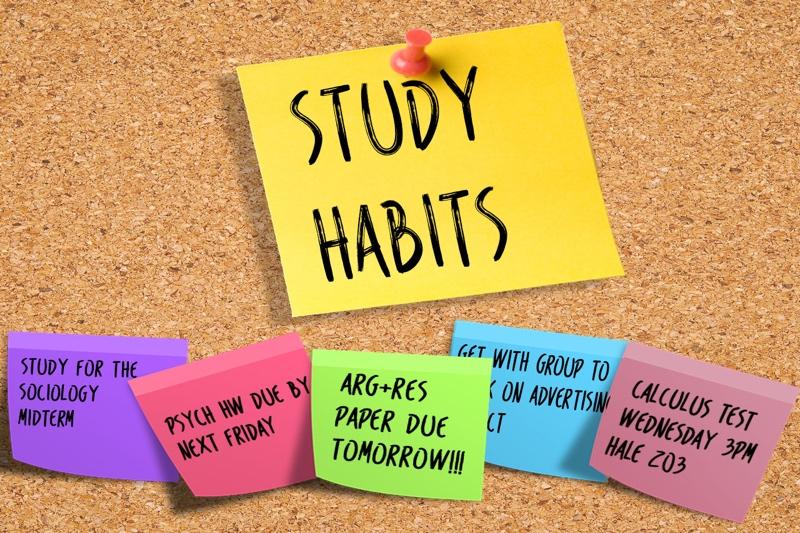This semester’s week of midterms is approaching at an unfortunate rate. Here are some tips that will help you be better prepared for your exams.
1. Make a plan
Make a list of all the things that you want to study each day and plan the rest of your day according to that list. You don’t have to plan out your whole week, but it can help to plan each day. I suggest using Google Calendar to track all of your meetings, classes and events. From there, you’ll be able to see how much free time you have and use that extra time in your schedule to study. Additionally, you should make sure to add eating and sleeping to your schedule.
2. Take away all the distractions
Whether it’s your gadgets or friends, you’re aware of what keeps you from focusing on your work. Try putting your phone on silent, or, if you have it on you, just put your phone away while you study.
3. How do You Want to Study?
Do you work well in a group? Or do you work better by yourself?
If you have tried studying with your friends but found yourself talking more than actually studying, then it is best to find some new people to study with, so try asking some of the students in your class to form a study group. Even though it may be a little hard if you’re not the type to ask for help, the worst thing that they can say is “no.” If you like studying by yourself, then finding a place to study should be no problem, the RMU campus has a number of spots.
4. Where do you want to study?
Can you focus in your room? Or do you prefer studying in the library?
If you like to study in the library but don’t like noise, go to the Quiet Study Room or any of the individual study rooms for maximum silence. If that doesn’t work, you can go to another building on campus that is not as busy during the evenings. The theater on campus is also a nice quiet place to study that you are able to take advantage of.
If you feel like leaving your room, and you live in Salem, Concord or Yorktown, try taking advantage of their study rooms. Not a lot of people spend their evenings in them, so you can gain some solitude while studying. If you enjoy studying in your room, then stick with it. There is no “best” place to study, so do what works best for you.
5. Read the textbook
Obviously, not all classes require you to read the textbook. For the classes that rely on the book, reading it will help immensely. It’s not going to be fun, but being able to see the examples in the textbook and how that applies to what you’ve learned in class is definitely helpful. Your notes from class can be compared to what you’re reading and add any information that you find important from the textbook into your notes.
Also, try reading the chapter in your textbook before going class for that lecture. When you’re in class, it’ll be a better review for you. As a bonus, you’ll be more engaged in what you’re learning as well.
6. Take notes
Whether you choose to type your notes or write them out, make sure you take good notes.
Even if you think it’s pointless since the PowerPoint is on Blackboard, you should still take notes in class,. Try to write down any facts that are not on the PowerPoint, or what the teacher says will be on the next test, and review your notes before and after class. You also might want to consider using notecards when you’re studying. It helps with memorizing facts, and you can carry them around with you anywhere and study on the go.
7. Ask questions
As you’re studying and have questions, you can email them to your teacher. If you’re in class and you have questions, but don’t feel like asking in class, you can go to the teacher after class or meet during his/her office hours. The last thing you want to happen is to fail something because you didn’t feel like asking for help. If you’re teacher isn’t available, go to the Tutoring Center on campus, and if your tutor can’t help you, then ask a classmate. You have options, so use them!
8. Study in small chunks
I’m pretty sure you have heard this one a bunch of times. There is truth to it, and being a procrastinator may mean that it won’t be as easy since your brain is trained to do things at the last minute. Using tips 1-7 should help you with studying in small chunks. If you haven’t been using this technique or any techniques that are similar, then these tips will help you out for the second half of the semester to prepare for finals.
9. Binge studying
If you’re so behind in all your classes that you have no other option, then binge studying may be your only and best option. You’ll have to temporarily forget sleeping to stay up all night and study, study, study. You’ll need to stay in a secluded area and shouldn’t even think about socializing. You’ll literally feel like crap and hate yourself for waiting until the last minute again, but you will have to stop thinking about what you could’ve done better and get to studying.
10. Give it your best
Some are better at this whole study thing than others. If you’re struggling, the worst thing you can do is to just give up. It might be hard when you’ve failed the first couple of quizzes and feel like you don’t understand the material very well, but this isn’t the end. You still have time to pick your grade up, so keep pushing.















